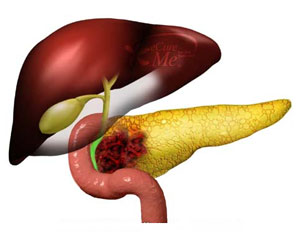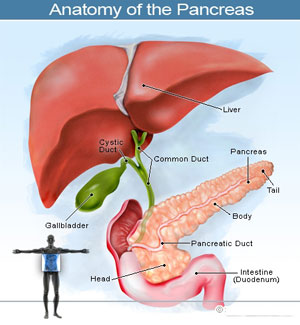Pancreatic Cancer (Part One)

What is pancreatic cancer?
Pancreatic cancer is a tumor of the pancreas. The pancreas is an organ located deep in the abdomen between the stomach and the spine. The pancreas is surrounded by the liver, small intestine, and other organs. It is about 15 cm long and has the shape of a banana. The wide part of the pancreas is the head, the middle part is the body, and the slimmest part is the tail.
The pancreas produces insulin and other hormones. These hormones enter the bloodstream and travel throughout our body. They help it use or store energy that comes from food. For example, insulin helps control blood sugar levels.
The pancreas also produces a fluid called pancreatic juice, which contains enzymes that help in the digestion of food.
The pancreas releases its juices through a system of tubes (ducts) that lead to the common bile duct. The common bile duct empties into the duodenum (the first part of the small intestine).
Cancer encompasses a group of malignant tumor diseases.
All types of cancers start in cells, which are the basic unit of life. Cells together form tissues, tissues together form organs, and organs together make up the body. Normally, cells grow and divide to form new cells as the body needs them.
When cells grow old and die, they are replaced by new ones. Sometimes this orderly process goes wrong. New cells form when the body does not need them, or old cells do not die when they should. These extra cells can form a mass of tissue called a growth or tumor.
Tumors can be benign or malignant;

- Benign tumors are not cancerous. Usually, doctors can remove them and in most cases, they do not return after removal. Cells from a benign tumor do not spread to the surrounding tissues or to other parts of the body. Most importantly, they are not life-threatening.
- Malignant tumors are cancerous. They are very serious and life-threatening. Cancerous cells from these tumors spread to the surrounding tissues and to other parts of the body. Also, cancerous cells can move into the bloodstream and lymphatic system. Through this way, cancerous cells spread from the primary tumor, creating tumors in other parts of the body. This type of cancer spread is called metastasis.
- Pancreatic cancer usually begins in the ducts (channels) where pancreatic juice passes. Pancreatic cancer can be called pancreatic cancer or pancreatic carcinoma.
- When pancreatic cancer spreads (metastasizes), cancerous cells are often found in the lymph nodes nearby. If the cancer has reached these nodes, it means that cancerous cells may have spread to other lymph nodes or to other tissues such as the liver or lungs. Sometimes pancreatic cancer spreads to the peritoneum (the tissue that lines the abdominal organs).
When cancer spreads from its original site to other parts of the body, the new tumor has the same abnormal cells and the same name as the primary tumor. For example, if pancreatic cancer spreads to the liver, the cancer in the liver has the same cancerous cells as those of the pancreas, and the treatment is for pancreatic cancer, not liver cancer.
Pancreatic Cancer: Who is at risk?
The exact cause is not known. It is more common in men than in women, and the risk increases with age.
It is more common among smokers and obese (overweight) people.
Almost 1/3 of pancreatic cancer is found in smokers. However, it is clear that it is not a contagious disease. No one can catch cancer from another person.
Research has shown that people with certain risk factors are more likely to develop pancreatic cancer. A risk factor is anything that increases a person's chance of developing a disease.
Very beautiful, this explains everything very clearly
Sent by marjo, më 23 September 2014 në 09:39
Very informative article, which clearly explains the disease, ways of examination and its treatment. As well as the expectations from the applied therapies. Side effects that are individual and that find a solution in cooperation with the doctor. Dietary diets, physical activity, optimism must be respected, and then it's in God's hands
Sent by Donika Thaka, më 20 April 2016 në 18:09